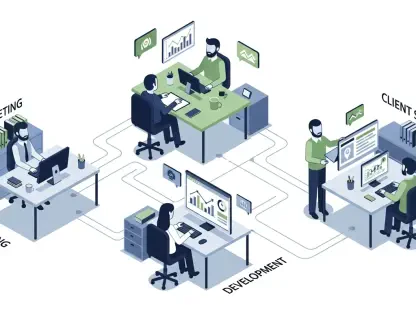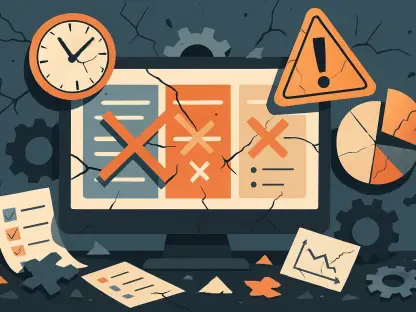In an era where technology is advancing at an unprecedented pace, Artificial Intelligence (AI) stands out as a transformative force reshaping the business landscape with remarkable innovation and opportunity. As the world fully embraces the potential of AI in 2025, entrepreneurs across diverse sectors are discovering ways to harness this technology to solve real-world challenges, streamline operations, and create value like never before. From healthcare to agriculture, education to finance, AI is not just a tool for tech giants but a democratized resource empowering even small businesses to compete on a global scale. This article explores 15 cutting-edge AI-driven business ideas that are making waves across industries, offering practical solutions to persistent problems. These concepts go beyond mere novelty, focusing on delivering measurable impact through specialization, ethical practices, and human collaboration. The journey into these opportunities reveals how AI can personalize experiences, adapt in real-time, and address niche market needs with precision. Success, however, hinges on balancing technological prowess with a deep understanding of market demands and a commitment to responsible implementation. Dive into this exploration of AI’s vast potential and uncover how these ideas are paving the way for a smarter, more connected business ecosystem.
Emerging AI Trends Shaping the Business Landscape
Democratization and Accessibility of AI Tools
The barriers to accessing advanced technology are crumbling, as AI becomes a viable resource for businesses of all sizes in 2025. Affordable Software-as-a-Service (SaaS) platforms and intuitive user interfaces have opened doors for small and medium-sized businesses (SMBs) to leverage sophisticated AI tools without the need for massive budgets or in-house expertise. This democratization is evident in applications like predictive analytics tailored for small retailers, which provide actionable insights into sales trends and inventory needs at a fraction of the traditional cost. By integrating seamlessly with existing systems, these platforms enable SMBs to make data-driven decisions that were once the domain of larger corporations. This shift not only levels the playing field but also fosters a wave of innovation as entrepreneurs experiment with AI in niche markets, driving economic growth and competition.
Beyond affordability, the accessibility of AI tools is sparking creativity in unexpected areas, reaching individual entrepreneurs and underserved industries. Cloud-based solutions and pre-built models allow users with minimal technical know-how to deploy AI for tasks like customer segmentation or operational forecasting. This trend is breaking down traditional silos, enabling startups to scale rapidly by adopting high-value services without the overhead of custom development. As a result, the focus shifts from merely possessing technology to applying it effectively, ensuring that even the smallest players can address specific pain points with precision. This widespread adoption underscores a broader movement toward inclusivity in tech, promising a future where AI-driven innovation knows no bounds.
Personalization as a Competitive Advantage
AI’s ability to tailor experiences to individual preferences is emerging as a defining factor in customer engagement across multiple sectors. In education, platforms powered by AI analyze student performance to create customized learning paths, ensuring that each learner receives content suited to their pace and needs, particularly in high-demand fields like data science. Similarly, in retail, AI drives personalized shopping experiences through targeted recommendations and dynamic pricing, significantly boosting conversion rates. This trend reflects a growing consumer expectation for interactions that feel uniquely relevant, positioning businesses that adopt personalization at a distinct competitive edge in 2025.
This focus on individualized solutions extends beyond surface-level customization to deeper, data-driven insights that enhance user satisfaction. By leveraging vast amounts of behavioral data, AI systems can predict needs before they are articulated, whether it’s suggesting a product or adapting a curriculum in real-time. Such precision not only improves outcomes but also builds loyalty, as customers and users feel understood on a personal level. However, the challenge lies in maintaining transparency about data usage to preserve trust, ensuring that personalization does not cross into intrusive territory. Businesses that master this balance will likely see sustained growth, as they meet modern demands for relevance without compromising ethical standards.
Real-Time Adaptability in a Fast-Paced World
In an increasingly unpredictable global market, AI’s capacity for real-time adaptability is proving indispensable for maintaining operational resilience. Systems designed for smart supply chain optimization utilize live data from suppliers, weather patterns, and market trends to predict disruptions and adjust logistics instantly, minimizing downtime for industries like manufacturing. Similarly, AI-driven cybersecurity solutions detect and counter threats as they emerge, safeguarding sensitive data with unparalleled speed. This ability to pivot dynamically ensures that businesses remain agile, addressing challenges before they escalate into costly problems.
The emphasis on immediacy also caters to the growing demand for responsiveness in customer-facing applications, where delays can erode trust. AI tools that analyze and react to incoming data streams—such as customer inquiries or market shifts—enable companies to stay ahead of the curve, offering solutions that feel proactive rather than reactive. This trend highlights a shift toward systems that not only process information but also anticipate outcomes, creating a seamless flow of decision-making. As markets continue to evolve at breakneck speed, the integration of real-time AI capabilities will distinguish leaders from laggards, ensuring survival in an era defined by constant change.
Industry-Specific AI Opportunities for Growth
AI Transforming Education and Content Creation
Artificial Intelligence is redefining how knowledge is delivered and consumed, particularly in the education sector where personalized learning platforms are gaining traction. These platforms harness AI to assess individual student strengths and weaknesses, crafting tailored curricula that adapt to each learner’s pace, especially in sought-after skills like coding or analytics. By incorporating natural language processing, these systems offer interactive tutoring, simulating one-on-one guidance at scale. Partnerships with educational institutions help validate their effectiveness, while metrics like certification pass rates demonstrate tangible value to stakeholders. This approach not only enhances learning outcomes but also addresses the growing need for flexible, skill-focused education in a competitive job market.
In parallel, AI-powered content marketing agencies are revolutionizing how businesses communicate with their audiences, blending automation with human creativity. These agencies use AI to generate high volumes of content—blogs, social media posts, and video scripts—while human editors ensure quality and brand alignment, often focusing on niche sectors like B2B software or healthcare. Standardized workflows and performance analytics allow for continuous improvement, ensuring that content resonates with target demographics. By offering scalable solutions, these agencies cater to businesses seeking cost-effective ways to maintain a strong digital presence, proving that AI can amplify creative output without sacrificing authenticity or relevance.
AI Enhancing Retail and Customer Service
The retail industry is undergoing a profound transformation through AI, which personalizes online shopping experiences to drive customer engagement and sales. Tailored product recommendations and dynamic pricing strategies, powered by machine learning, analyze user behavior to present offers that match individual preferences, significantly increasing conversion rates. Starting with specific product categories allows for focused impact, while integration with existing e-commerce platforms ensures a smooth rollout. Success is measured by clear metrics like sales growth, emphasizing the importance of delivering value through customization in a crowded digital marketplace.
Meanwhile, automated customer service solutions are redefining support standards by meeting the demand for 24/7 availability at reduced costs. AI chatbots and voice assistants handle routine inquiries with efficiency, incorporating sentiment analysis to detect customer frustration and escalate complex issues to human agents. A focus on industry-specific needs—such as retail or hospitality—ensures relevance, while metrics like resolution times and satisfaction scores highlight effectiveness over mere cost savings. This balance between automation and empathy addresses the modern consumer’s expectation for quick, reliable assistance, positioning AI as a cornerstone of superior service delivery.
AI Innovations in Healthcare and Finance
In healthcare, AI is paving the way for personalized wellness coaching by analyzing data from wearables and medical records to offer customized diet, exercise, and lifestyle recommendations. Strict adherence to regulations like HIPAA ensures data privacy, while partnerships with healthcare providers lend credibility to these solutions. Measurable outcomes, such as improved blood pressure or weight loss, serve as benchmarks for success, demonstrating AI’s potential to enhance individual health on a broad scale. This approach not only empowers users to take control of their well-being but also addresses systemic challenges like rising healthcare costs through preventive care.
Similarly, AI-powered financial advisory services are democratizing access to wealth management, making investment planning and tax optimization available to a wider audience via robo-advisors. Transparent fee structures and compliance with financial regulations build trust, starting with simple products before expanding into comprehensive offerings. This scalability ensures that individuals and small businesses can benefit from expert-level advice without the traditional expense, leveling the financial playing field. By focusing on user education and clear communication, these services foster confidence in automated systems, proving that AI can deliver precision in a field where trust is paramount.
Operational and Niche AI Solutions Driving Efficiency
AI Optimizing Supply Chains and Agriculture
Smart supply chain optimization stands as a prime example of AI’s ability to enhance operational efficiency, using real-time data from suppliers, weather forecasts, and market fluctuations to predict disruptions and streamline logistics. Particularly in industries like manufacturing, these systems minimize delays and reduce costs, offering clear return-on-investment metrics that justify adoption. Strong integration with existing infrastructure, coupled with consulting services to ease implementation, ensures that businesses can adapt without upheaval. This focus on actionable insights and measurable savings highlights AI’s role in building resilient supply networks in a volatile global economy.
In agriculture, AI is addressing critical issues like food security by optimizing farming decisions through satellite imagery and IoT sensors. These tools analyze soil conditions, weather patterns, and crop health to boost yields, providing farmers with data-driven guidance. Building relationships with agricultural communities ensures relevance, while innovative financing models support cash-strapped producers in adopting technology. The emphasis on clear outcomes, such as increased productivity, underscores the potential for AI to transform traditional industries, fostering sustainability and efficiency in food production for a growing population.
AI Strengthening Cybersecurity and Legal Services
AI-driven cybersecurity solutions are becoming essential in an era of escalating digital threats, offering real-time detection and response through machine learning that identifies anomalies before they become breaches. Constant updates to counter evolving risks, alongside certifications and partnerships, establish credibility in a field where trust is critical. Measurable outcomes, such as reduced attack frequency, provide concrete proof of value, ensuring that businesses can protect sensitive data with confidence. This proactive approach to security reflects the urgent need for adaptive technologies in safeguarding digital assets across industries.
In the legal sector, AI-enhanced services are automating time-intensive tasks like document review and research, significantly reducing costs for firms and clients alike. Accuracy and confidentiality remain paramount, with partnerships ensuring trust and compliance with strict data protection standards. The focus is on saving time rather than replacing human expertise, allowing lawyers to prioritize strategic work over routine processes. By delivering precision and efficiency, these solutions address long-standing inefficiencies in legal practice, proving that AI can augment professional services without undermining their core human elements.
AI Streamlining Recruitment and Real Estate
AI is transforming recruitment by automating repetitive tasks like resume screening and initial video interviews, while also assessing cultural fit through advanced algorithms. A strong emphasis on transparent, bias-free processes ensures fairness, alongside compliance with employment regulations to protect both employers and candidates. Enhanced candidate experiences and improved hiring efficiency emerge as key benefits, with integrated tools simplifying complex workflows. This technology enables HR teams to focus on building relationships rather than managing paperwork, redefining talent acquisition for a competitive market.
In real estate, AI-powered services enhance property valuation, market analysis, and buyer matching, accelerating transactions for agents and clients. Partnerships with established firms provide access to reliable data, while adherence to regulatory standards ensures accuracy and trust. The focus on speed and precision addresses pain points in a traditionally slow-moving industry, offering measurable improvements in deal closure rates. By leveraging AI to connect the right properties with the right buyers, these solutions demonstrate how technology can modernize even the most conventional sectors, driving efficiency and satisfaction.
Automation and Media Innovations Fueling Growth
AI Automating Business Processes and Video Production
AI-powered business process automation is tackling inefficiencies in manual workflows, particularly in regulated industries where unstructured data poses significant challenges. Targeting high-volume processes, these solutions deliver clear ROI through reduced labor costs and error rates, with seamless integration into existing systems ensuring minimal disruption. Support for change management further aids adoption, helping employees adapt to new tools without resistance. This focus on measurable impact and scalability positions AI as a catalyst for operational excellence, enabling businesses to redirect resources toward innovation and growth.
Automated video production, on the other hand, meets the skyrocketing demand for visual content in marketing and social media by transforming text or raw footage into polished, branded videos. Customizable templates and platform integration cater to professionals seeking efficiency, while continuous refinement based on engagement data ensures relevance. This technology empowers businesses to maintain a consistent online presence without the expense of traditional production, democratizing access to high-quality media. By blending automation with creative adaptability, AI is reshaping how stories are told in the digital age, offering scalable solutions for a content-hungry world.
Reflecting on AI’s Transformative Journey
Looking back, the exploration of AI’s impact on business revealed a remarkable evolution, as technology seamlessly integrated into diverse industries to address longstanding challenges with precision and ingenuity. The past years showed how AI shifted from a niche tool to a widespread enabler, empowering sectors from healthcare to agriculture with tailored solutions that prioritized real value over mere innovation. Each idea, from personalized learning to real-time cybersecurity, reflected a commitment to solving specific pain points while upholding ethical standards and human collaboration. As this journey unfolded, the balance between automation and oversight emerged as a defining factor in ensuring trust and sustainability. Moving forward, the focus should shift to actionable steps—entrepreneurs are encouraged to start small, test solutions in niche markets, and scale with data-driven insights. Prioritizing robust data quality and regulatory compliance will remain critical to avoiding pitfalls and building credibility. Ultimately, the next phase of AI innovation lies in fostering adaptability, ensuring that businesses can evolve alongside market shifts while keeping human needs at the forefront of every technological advancement.









